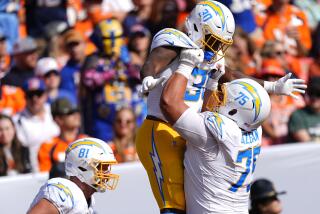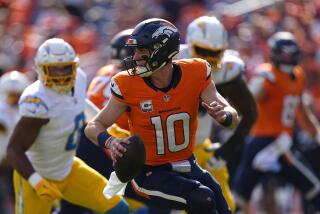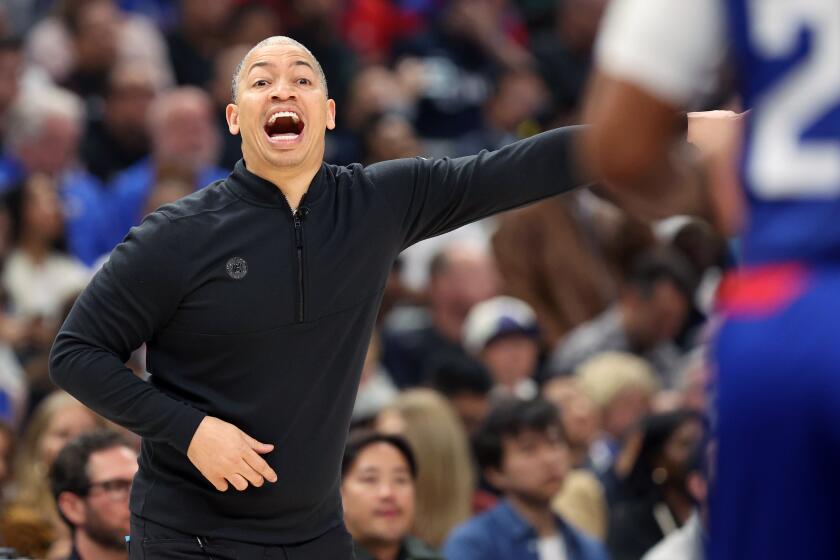This Time, It Was a Bronco Runaway : Pro football: Bobby Humphrey has given Denver’s offense 1,100 yards and its defense some extra time to rest.
- Share via
SAN DIEGO — When reasons are sought for the Denver Broncos’ return to prominence this season, the first thing mentioned is their beefed-up defense.
Without a doubt, the unit assembled by defensive coordinator Wade Phillips, successor to the deposed Joe Collier, has been a major factor in the Broncos’ turnaround from 8-8 also-rans to AFC West champions. The Broncos’ yield of 207 points is the lowest in the NFL.
But the defense has not done it all. Just as important, Coach Dan Reeves finally has found a running game to complement the passing of quarterback John Elway.
For more years than Denver fans care to remember, Bronco running backs could best have been described as plodders. Now, though, Bobby Humphrey has arrived from Alabama, and the drought is over. In his rookie season, Humphrey has become the Broncos’ first 1,000-yard runner since Otis Armstrong in 1976.
A career-high 128-yard day last Saturday pushed Humphrey’s total to an even 1,100. He needs only 54 yards against the Chargers Sunday at San Diego Jack Murphy Stadium to take second place on the Broncos’ all-time single-season list, behind Armstrong’s 1,407 of 1974.
Humphrey isn’t the only rookie in the Denver backfield. Two others, first Jeff Alexander and now Mel Bratton, have handled the fullback duties, most of which involve blocking for Humphrey.
Last year, with an over-the-hill Tony Dorsett operating as the main back, the Broncos’ running game ranked 19th in the league. Now it ranks fifth, and the emergence of Humphrey is largely responsible.
What may not occur to the average fan is that this newly discovered offensive weapon has contributed to the Broncos’ improvement on defense.
“Bobby Humphrey has allowed us to do things with our running game that take the pressure off our defense,” Reeves said. “It has allowed us to eat up the clock, and when the defense is not on the field a lot, that’s very important.
“Bobby has natural instincts, great instincts, and he knows the blocking schemes as well as any runner I’ve seen. He anticipates blocks almost before they’re made.”
According to the leader of the Denver defense, Karl Mecklenburg, Reeves didn’t overstate the case.
“The running game has meant everything to us,” Mecklenburg said. “We used to have the same problem that San Diego had when Dan Fouts was in his prime. Our offense scored points so quickly that the defense went right back on the field.
“The longer the defense is out there, the greater the danger of giving up a big play. Also, we’re not turning the ball over, so we keep possession for long periods of time.
“Humphrey and Bratton are great football players. With them, we’re a much better balanced football team. We don’t rely on our passing game anymore. You win games running, you win games passing, you win games with turnovers and you win games defensively.”
Both Humphrey and Bratton were steals in the draft. Both were held back by injuries suffered in college, and in both cases the Broncos stepped in where most other teams feared to tread.
Bratton was regarded as a certain first-round draft choice at Miami until he tore up his left knee in the 1988 Orange Bowl game. The Miami Dolphins picked him in the sixth round, but he didn’t sign, so he went back into the draft for 1989. Even though he hadn’t played at all last year, the Broncos took a flyer on him in the seventh round, and he is now their starting fullback.
Humphrey went into the 1988 season as a Heisman Trophy candidate at Alabama, but he had suffered a stress fracture in his left foot in spring practice and reinjured the foot in the second game. He missed the rest of the season and could have stayed for a redshirt year but elected instead to go into the supplemental draft. The Broncos used their first-round pick for 1990 to take him, and they struck gold.
Humphrey, 23, was a two-time All-American and a premier receiver as well as runner. He averaged 5.5 yards a carry as he rushed for 3,783 yards and 37 touchdowns. He also caught 70 passes for 600 yards and eight touchdowns, and returned 48 kickoffs for a 21.9-yard average. He even completed his only pass for 57 yards and a touchdown, a feat he repeated last week with a 17-yard pass to Bratton.
Besides his 1,100 yards rushing and seven touchdowns thus far in his first pro season, Humphrey has caught 20 passes for 141 yards. He has been named an alternate for the Pro Bowl in Honolulu on Feb. 4 and is a strong candidate for rookie of the year.
All this has left the 6-foot-1, 200-pound Humphrey wondering how he could have done so much so soon.
“I never expected these things, not at all,” he said. “A lot of it is shocking, because everything happened to me so late.
“I was only in camp three or four days before the last (exhibition) game, and I didn’t do so well in that. Then I bruised a thigh, and I couldn’t maneuver the way I wanted to. I knew all along it could be done, but I didn’t think it could be done this year. I had no idea I would come right in and be a starter.”
After playing a reserve role for four games, Humphrey gained 102 yards against the Chargers in his first pro start. He now ranks fifth in the AFC, 282 yards behind leading Christian Okoye of Kansas City, and one wonders where he would be if he had been a regular all season.
“Bratton has been a big help to me.” Humphrey said. “He’s a great blocker. Alexander is, too. I wouldn’t be anywhere near where I am without them.”
Asked about his own blocking, Humphrey laughed and said, “I’m improving a lot. I never did block in college, so I’m learning from scratch.”
Humphrey sometimes feels awe-struck playing in the same backfield with Elway.
“He’s just amazing,” Humphrey said. “You hear all about great players like that and you see them on television, but you never know you’ll be in the company of those guys. You just never imagine anything like that. It’s a big honor.”
Humphrey recalled that he agonized quite a while before deciding to give up his last season at Alabama.
“It was a tough decision for me,” he said. “I couldn’t go into the regular draft in April because I don’t think it would be appropriate with my foot still in a cast. At one point I didn’t know what to do, so I waited until the deadline for the supplemental draft in June.
“I worked out for 15 clubs, but I was unimpressive, because I had just come off the injury and hadn’t fully recovered. When I finally decided to go to the pros, I was very disappointed that I lasted until the 17th pick. A lot of people thought I wasn’t going to make it, so I had something to prove.
“I was hoping I’d wind up in someplace warm, but I’m happy the way things turned out.”
Obviously, Humphrey is no happier than Reeves, who thought all along that the running back was worth the gamble.
“There was no question that we would take him,” Reeves said. “The only question was whether he would be there when we picked. We knew his foot was OK, and we knew he wasn’t in shape when he worked out, which turned off some clubs.
“Still, he hadn’t played in a year, and when you’ve got a guy with an injury, you don’t really make plans. You just hope he can show he’s over the injury. But then we saw him in the (exhibition) game against Dallas, and we started to say we’d better make some plans.”
A lot of scouts who passed on Humphrey have red faces today. He never had blazing speed--”I’m like a 4.7 (seconds) in the 40(-yard dash),” he said--but he had great moves and body control, and he didn’t lose anything because of his injury.
“I’m more of a Marcus Allen runner,” he said, comparing his style to that of the Raider veteran. “I guess you could say I’m a slasher.”
Becoming a 1,000-yard runner as a rookie hasn’t lulled Humphrey into self-satisfaction.
“It has given me confidence and more incentive, but I know I still need work on some things,” he said. “I have to get better at reading blocks and improve my run-blocking. When I do that, I can compete with anybody.”
And how is Reeves to play for?
“He’s all right,” Humphrey said. “He tough, and he has his moments. Fortunately, I learn fast, and I try not to make the same mistake twice.”
More to Read
Go beyond the scoreboard
Get the latest on L.A.'s teams in the daily Sports Report newsletter.
You may occasionally receive promotional content from the Los Angeles Times.










